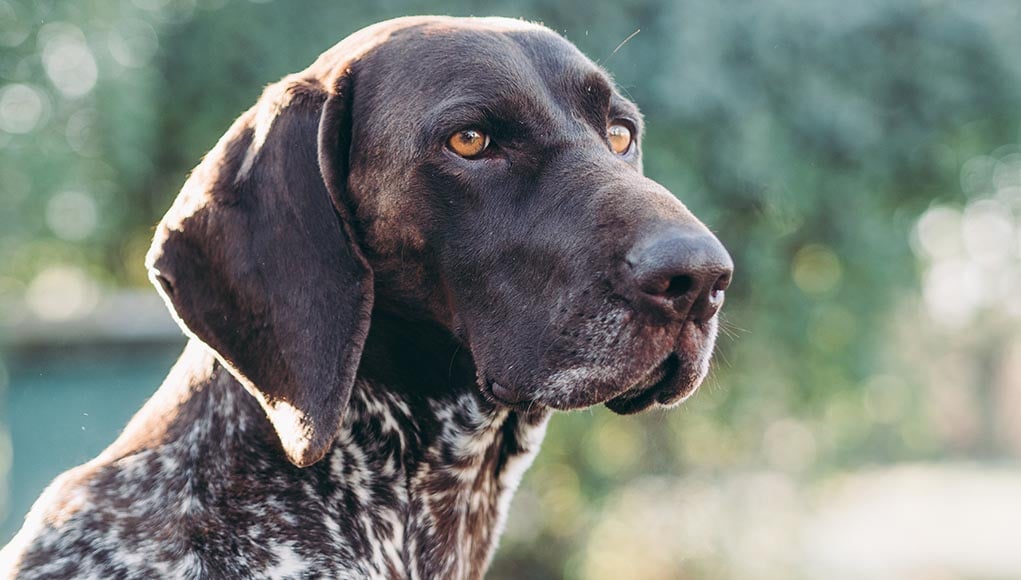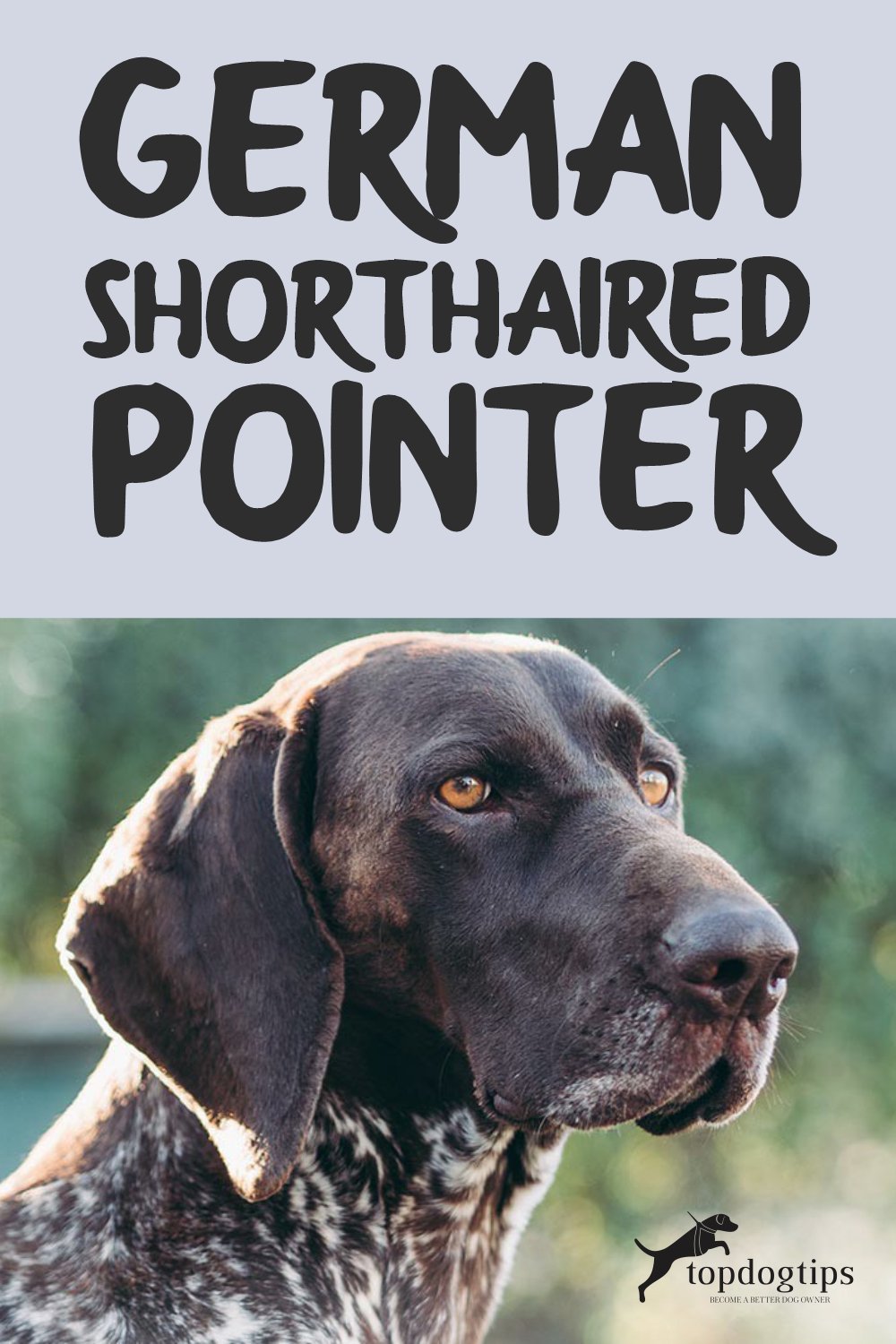Table of Contents
Choosing the best breed for a dog can be challenging, right?
You and your family might need a lot of things to consider when owning a specific breed of dog.
A German shorthaired pointer or GSP might be an excellent breed to own!
Here is Dog Breed Profile to assist you with everything you need to know.

German Shorthaired Pointers love adventures so much! They can go hiking, camping in the woods, or catching fish in the river.
They also love walks, playing catch, and even talking to their owner.
But they are also fearless! This makes them braver than any other dog breed.
Aside from that, German Shorthaired Pointers love to spend time with their families.
This loveable breed is not just affectionate and brave. GSPs are also very smart and obedient to their owners.
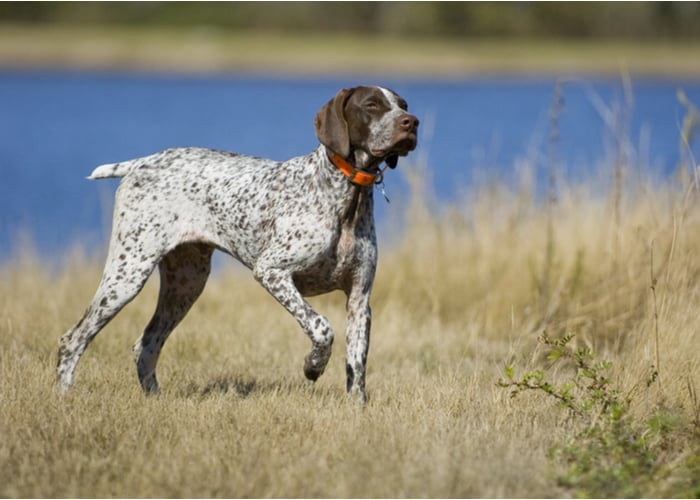
Significant Characteristics of a German Shorthaired Pointer
This medium-sized German Shorthaired Pointer dog is trained to hunt both inland and water and is considered a sporting dog breed due to its instincts.
They are one of the few hunting dog breeds that can be an all-rounder. GSPs can perform both a pointer and a retriever.
German Shorthaired Pointer dogs can hunt upland birds, rabbits, raccoons, and deer.
GSP's ability to hunt makes them very outgoing, full of energy, and enthusiastic both at play and at work! They love to be around people and are also child–friendly. It's one of the most versatile dog breeds and is a good family companion.
Typically, German Shorthaired Pointer Dogs and German Shorthaired Pointer Puppies are not hard-headed and can learn new tricks quickly. They tend to work hard when provided with treats, praises from their owners, and more plays.
Size
The male German Shorthaired Pointers stand at the height of 23 to 25 inches and weigh around 55 to 70 pounds, while females are 21 to 23 inches tall and are 45 to 60 pounds in weight.
Physical Characteristics
The GSP has seven breed colors: black, black & white, reddish-brown, reddish-brown & white, reddish-brown roan, reddish-brown & white, and black roan, including markings that are either ticked, patched or patched and ticked.
Its eyes are the shape of almond that shines with excitement! Their ears are big and lie side by side with their head, and they also have a large brown nose. The tail is usually docked, which leaves 40 percent of its original length.
Their coat provides enough warmth and insulation during cold weather. This kind of coat makes them a great hunting companion, either inland or in water.
Male German Shorthaired Pointer dogs are thicker with broadheads and more emphasized jaws. While female German Shorthaired Pointer dogs are leaner and lighter on their feet, their skulls are narrow and shiny.

Known Facts for German Shorthaired Pointer
They Love Water!
They have webbed feet to help them navigate through lakes, ponds, creeks, and pools. Other than that, they also have water-resistant coats. Indeed, German Shorthaired Pointer Dogs are excellent water dogs and love to swim!
GSPs Can be Good Fitness Buddies.
They have lots of stored energy to burn and will let you know when it's already playtime. Since they are an active kind of dog, German Shorthaired Pointer dogs are best with physically active owners and love to do outdoor activities!
Their muscular and athletic build is excellent for exercise. An hour or two per day will be a fantastic deal for GSPs!
RELATED ARTICLE: Picking a Dog Based On Your Lifestyle and Living Situation
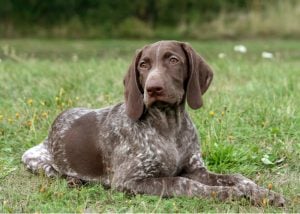
They can be guard dogs, too!
The male German Shorthaired Pointers are more outgoing and are more aggressive hunters than the female GSPs. They don't bark aggressively. However, they will notify you when an outsider or a visitor is inside your premises.
German Shorthaired Pointers need lots of love and affection!
This loving personality of GSP may also cause them to be sad if they are left alone for a long time. They may develop nervousness and a destructive attitude if not provided with regular exercise and a buddy to go with.
German Shorthaired Pointer Dog's Personality and Temperament
They are active most of their lives, but between 6 months to 3 years old, German Shorthaired Pointer puppies will need more affection from their owner and lots of activities because their energy at these ages is at its peak!
Male and female German Shorthaired Pointer dogs have distinct personalities. Male German Shorthaired Pointers are slower than the female German Shorthaired Pointer dogs.
GPSs have a strong prey drive because of their hunting background, which means that they are already conditioned to chase any animals that cross their way. Since they are free-spirited animals, a high-fenced yard and a leash during walks would be a great idea.
They are most likely to stray off when not being trained to stay by your side. But, worry no more! With lots of teaching and a little bit of patience, this breed is quick to learn.
Other than that, both genders love to keep their puppy-like personality throughout their lifetime.
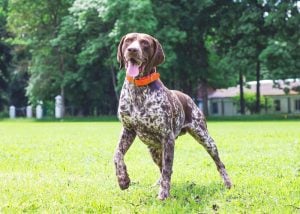
German Shorthaired Pointer Dogs Hate Being Bored
These dogs are usually called working dogs, which means they are bred to do a job. When left alone, these pointers will most likely wander off the neighborhood, so it's necessary to have the dogs wear their tags all the time. It will help other people to identify them and call you when an emergency arises.
Providing GSPs with lots of games, exercises, and interactions will help them keep their minds occupied.
How to Feed German Shorthaired Pointer Dog
The recommended daily amount is 2 to 3 cups of high–quality dry food and is divided into two meals per day.
It is essential to take note that the amount of food the dog eats will depend on their age, size, build, metabolism, and activity per day. You will also put the quality of the food you're going to feed them into consideration – the better the quality, the more nourishment your dog will get.
It is necessary to keep your German Shorthaired Pointer dog in its best shape! You can achieve this by measuring his food and only feeding him twice a day.
A German Shorthaired Pointer puppy under six months old needs to be fed twice daily. As for the adult German Shorthaired Pointer, morning and evening meals should be enough.
This breed is prone to bloating, so you should not feed them right after vigorous exercise or outdoor activities. They are also not allowed to do training for at least one hour after eating and drinking.
The ideal evening meal for adult German Shorthaired Pointer is when all the day's physical activities are over.
If you have doubts about your GSP being overweight, follow this simple process:
Give him the eye and hands-on test. You need to first look down on him, and you should be able to see his waist. Place your hand on his back and gently thumb along the spine, with your fingers spread downward. By then, you should be able to feel his ribs. If you can't handle it, you'll need to lower down his food intake and give him more exercise than usual.
READ NEXT: How to Put an Overweight Dog on a Diet?
Choosing the best food for GSPs is essential if you want them to be in their proper health condition. A food that can meet the nutritional needs of the GSPs is the topmost priority if you're the owner.
Here are the top 5 picks of the best food for German Shorthaired Pointer dogs:
- Taste of The Wild High Prairie Grain-Free Adult Dry Food
- Blue Buffalo Basics Grain-Free LID Lamb & Potato Large Breed Recipe
- Nutro Ultra Large Breed Adult Dry Dog Food
- Diamond Naturals Skin & Coat Real Salmon and Potato Recipe Dry Dog Food
You can find more trusted food brands for your dogs in the best dog food brand reviews.
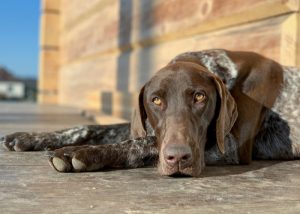
Proper Grooming for German Shorthaired Pointer Dog
This breed needs frequent brushing during the shedding season to get rid of their loose hairs that can cause difficulty in removing them in carpets and furniture. Compared with other breeds, GSPs are considered clean and shed less.
Nonetheless, German Shorthaired Pointer puppies and dogs only require a once-a-year brushing or just a glooming glove every other day.
They enjoy taking baths with a mild shampoo; twice a year bath may be a bit too much for this kind of breed because they usually rely on their natural oils for protection on their skin. When drying them after a bath, use a towel or chamois for additional shine on their coat.
Always make sure to check their feet after they undergo excessive exercise and play along the field. Trim their nails and inspect their ears for any signs of infection, such as foul odor, redness, or tenderness.
Note: If your GSP is constantly scratching his ears, it may be a sign of infection!
RELATED ARTICLE: How to Calm your Dog Before Grooming
The lifeSpan of German Shorthaired Pointer Dog
The life span of German Shorthaired Pointers is 12 – 14 years, and this is for the healthy ones, but just like any breeds, GSPs are still prone to health complications. Although not all GSPs will get these diseases, it's essential to be aware of them if you're considering getting this kind of breed.
According to the German Shorthaired Pointer Club of America (GSPCA), the potential health complications for this breed include hip dysplasia, cancer, lymphedema, entropion, heart problems, and Von Willebrand's Disease. They are also prone to gastric dilation volvulus, life-threatening as the stomach can be swollen.
As a German Shorthaired Pointer puppy owner, you should be able to talk to your trusted veterinary doctor on how to prevent gastric dilation volvulus from occurring.
If you decide to buy a German Shorthaired Pointer puppy, be sure that the breeder can provide a health clearance for the puppy's parents. It will help prove that the puppy is free from any infections and diseases.
Owners should educate themselves with what disease the symptoms have been showing and what they can do to treat or prevent it from happening.
Living Arrangements for German Shorthaired Pointer Dog
German Shorthaired Pointer dogs don't work well with small spaces because they need more room for their leg stretches. They do best in large homes with spacious yards.
These dogs need an owner with an active lifestyle and a vast space to accommodate their high energies. Their high point, most especially as puppies, can be challenging for impatient first-time owners.
GSPs have fun running around the backyard with the kids. Since this breed is very energetic, it's more advisable to play with children ages six years old and above.
They don't like being left alone, so if you're someone who always goes out, you may want to rethink your decision in owning one. They also need patient humans with great dedication to stick with them from their puppy phase up until they are old enough.
German Shorthaired Pointer dogs don't make an ideal companion for people who have limited activities. They require a lot of physical stimulation to keep them occupied to avoid being bored, which may lead to destructive behavior.
German Shorthaired Pointer Dog with Children and Other Pets
German Shorthaired Pointer dogs make a great family pet and a good companion for children when raised together. They make an excellent playmate for active growing children as they have lots of energy to offer. But it is also essential to note that when GSPs are playing with children, they need adult supervision to burst out with excitement.
Adult German Shorthaired Pointer Dogs that are not familiar with children interaction are best to stay at home with older ones who know how to handle dogs. It's best to teach children how to hold and interact with dogs appropriately.
Note: Always give out guidance to young kids when dealing with different kinds of dogs to prevent any untoward accidents.
RELATED ARTICLE: Do Your Kids Know How to be Around Dogs?
German Shorthaired Pointer dogs can get along with other breeds of dogs, although some may show aggressiveness towards the same gender. They may show ferociousness towards small furry animals like cats or rabbits because they are hunting dogs.
On the brighter side, they can exhibit social skills with this type of animal when being raised with them since puppyhood. They can be very friendly and playful with other canine friends but may not extend their social abilities to strangers and intruders on their property.
RELATED ARTICLE: Good Breeds for a House Dog
German Shorthaired Pointer History
German breeders wanted an all-rounder dog, so they spent generations after generations perfecting this hunting dog in the 1700s to 1800s. It's pretty challenging to determine which breeds were combined to produce the brilliant and versatile German Shorthaired Pointer. Still, it has been known that it is the product of Spanish Pointers and Bloodhounds, which results in their massive structure with a powerful nose.
The Prince of the Royal House, Prince Albrecht zu Solms – Braunfeld, was credited to select based on function rather than form. Therefore, resulting in a lean, athletic, responsive, intelligent, affectionate, and all-around hunting dog.
The First German Shorthaired Pointer in The US
The first-ever German Shorthaired Pointer to be known in the United States of America was imported by Dr. Charles Thornton of Montana in 1925, who then began to breed dogs. Five years later, the German Shorthaired Pointer dogs gained American Kennel Club recognition.
The first German Shorthaired Pointer that was registered in the United States was named Greif v.d. Fliegerhalde.
World War II (WW II) made a significant impact on the breeding of German Shorthaired Pointers. With the war coming to an end, many golds, diamonds, artworks, Lipizzaner stallions, and German Shorthaired Pointers were kept hidden by the breeders. The GSPs were immediately sent to Yugoslavia for safekeeping.
Since the Yugoslavians were behind the Iron Curtain after WWII, west German breeders were prohibited from interacting with their most OK dog, the German Shorthaired Pointer. They were forced to produce them with a limited gene pool.
These German breeders did an excellent job producing a German Shorthaired Pointer dog that, even up to this date, is still one of the best hunting and tracking dogs. They are praised for their strong sense of smell, ability to rescue waterfowl, and bravery to go against more giant animals.

Where To Buy German Shorthaired Pointer Puppies
According to the American Kennel Club, the German Shorthaired Pointer (GSP) is one of the most known dogs in the United States of America. So, there's an excellent probability that you will find one for free!
Getting Puppies Through Adoption
If you opt to adopt German Shorthaired Pointer puppies, you can look into animal shelters in your area and find one to adopt since this breed is popular in the USA.
Adopting a dog can save you lots of money and time because, if not all, most of them are already vaccinated and are already spayed or neutered. And through adoption, it's not just about giving him a new home. You practically free up a space that you can use to cater to other dogs in dire need of help.
Through a Breeder
A German Shorthaired Pointer puppy will cost from $600 – $1,500. The pricing will still be based on the breeder you choose to buy your puppy.
It's great to choose a breeder who is experienced enough to breed a dog with little to no health complications, but there's a possibility that they will charge you more since they produce a top-quality German Shorthaired Pointer puppy.
Breeding German Shorthaired Pointers
The average litters of GSPs are 8 to 12 puppies. Their litter size is more significant than other breeds, but of course, the breed's size limits the size of the litter.
The German Shorthaired Pointers are medium-sized breeds.
There are few birthing problems with GSPs because their females have two uterus horns and will birth out the puppies in pairs. By nature, the female German Shorthaired Pointers will dig a hole for them to give birth in.
If the breeders know how to breed German Shorthaired Pointers, pregnancy problems are the slightest concern.
Breeding German Shorthaired Pointers will include using proper bloodlines and a superior gene. This will help minimize hereditary health complications and produce an outstanding, top-quality litter since these dog breeds are very expensive.
You might want to ask your veterinary doctor for any recommendations for reputable breeders.
WANT TO SHARE THIS…


